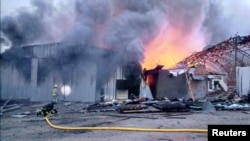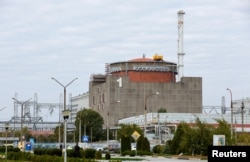New Developments:
- The European Commission said Friday that it had agreed in principle to resume the transit of Ukrainian grain through five European Union countries that had imposed restrictions.
- NATO allies have delivered almost all promised combat vehicles to Ukraine, including more than 1,550 armored vehicles and 230 tanks.
- In a meeting with Russian lawmakers, President Vladimir Putin said Friday that Moscow would expand ties with countries in Eurasia, Africa and Latin America to counter what he called the West's "economic aggression."
Ukrainian President Volodymyr Zelenskyy used his nightly video address Friday to condemn massive Russian airstrikes, the first such large-scale strikes in months.
In Uman, a town in central Ukraine, at least 23 civilians were killed in their sleep early Friday morning, officials said.
"A missile on Uman, a city that is peaceful, known to the whole world for hosting tens of thousands of Hasidic pilgrims every year. … Only absolute evil can unleash such terror against Ukraine,” Zelenskyy said.
"My neighbors are gone. No one is left," Serhii Lubivskyi, 58, who survived inside a flat on the seventh floor, told Reuters.
He and his wife escaped to their balcony, where firefighters rescued them.
Those killed included three children. An estimated 109 people were living in the part of the building that was hit, and 27 apartments were destroyed by the blast.
In Dnipro city in southeast Ukraine, a missile killed a 2-year-old child and a 31-year-old woman, regional Governor Serhiy Lysak said.
In a tweet, the U.N. Office for the Coordination of Humanitarian Affairs also condemned Russia’s airstrikes on civilians and civilian infrastructure.
“It is just inexcusable that in places like Uman, far from the front line, civilians were killed while sleeping at their homes. This must stop," Matthew Hollingworth, humanitarian coordinator, wrote.
Moscow said it was targeting Ukrainian reserve troops and that they were struck successfully, preventing them from reaching the front lines. Russia supplied no evidence to support this, according to Reuters.
Zelenskyy reiterated that only heavy, hard-hitting weapons could stop the war and save lives.
“Air defense, modern aircraft, artillery, armored vehicles are necessary to provide security to our people who are still, unfortunately, in the occupied territory,” he said. “We cannot leave anyone under the power of Russian evil.”
The latest assessment by the Institute for the Study of War supported Zelenskyy’s assertions.
“Metering Western support to Ukraine and inadequately resourcing all of the required Ukrainian counteroffensives – not just the next one – will protract Russia’s war and increase the associated risks for the U.S.,” ISW said.
EU grain deal
The European Commission said Friday that it had agreed in principle to allow the transit of Ukrainian grain to restart through five European Union countries that had banned imports.
Bulgaria, Hungary, Poland, Romania and Slovakia had cited concerns that grain from Ukraine that was supposed to be exported to other countries ended up in their local markets, pushing down prices for their farmers.
In a tweet, European Commission Vice President Valdis Dombrovskis wrote that the EU had reached "an agreement in principle" with the five "to address concerns of both farmers in neighboring EU countries and Ukraine.”
The deal also includes a support package worth 100 million euros ($110.25 million) for the support of local markets, Dombrovskis said.
Zaporizhzhia nuclear plant
Russia may be preparing to connect the Zaporizhzhia nuclear plant, Europe's largest nuclear power plant, to the power grid of Russian-controlled territory, a U.N. agency said.
An International Atomic Energy Agency team of experts monitoring the plant’s operations said Friday that Russian forces and the Russian nuclear company Rosatom had ordered the skeleton crew there to link the plant’s only working line “to the currently Russian-controlled electrical grid, to the south of the ZNPP site."
This line is the only source of external power to the plant, which it needs to keep cooling the fuel in its six reactors, even though they are shut down. Failing to cool that fuel could lead to a potentially catastrophic nuclear meltdown, the IAEA said.
In a statement Friday, IAEA Director General Rafael Grossi reiterated that the “increased military presence and activity in the region” underscored the need to safeguard the plant from continuous shelling and landmine explosions in the area.
A Russian mine exploded near the generator room of the fourth power unit at the nuclear plant, Ukraine's state operator Energoatom said Thursday.
It also said Russian troops, who last year seized control of Ukraine's largest nuclear complex, told workers that it was "their own mine that detonated," according to Reuters.
Airstrikes continue
Meanwhile, the threat of Russian airstrikes continued across Ukraine, with officials warning residents to take shelter as soon as they heard sirens.
"Do not ignore the alerts," Andriy Yermak, head of Zelenskyy's office, said on the Telegram messaging app hours after deadly Russian missile strikes earlier Friday.
The attacks came days after Zelenskyy spoke by phone with Chinese President Xi Jinping about finding a solution to the war. The Chinese leader said China would dispatch a peace envoy to Ukraine.
Some information for this report came from The Associated Press, Agence France-Presse and Reuters.








